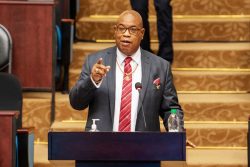Approaching three years since his government took office, President Ali continues to refuse to convene press conferences, a most extraordinary circumstance as far as modern governance goes. This refusal to hold press conferences also evinces a lack of recognition and respect for the role that the media plays in ensuring government accountability and providing an interface through various platforms between the President and the people. It appears that the President’s notion of accountability to the public and the media – aside from his occasional addresses to the nation – is the answering of questions haphazardly lobbed at him on the sidelines of events. It also appears that another stratagem is to have others in government answer on his behalf or to impose their views as reflective of presidential authority. That is no substitute at all for press conferences.
Every government faces crises from time to time where it is imperative that the leader be questioned intensely about actions and policies. Question time in the British Parliament is a medium through which MPs hold the Prime Minister accountable. There is no such opening here and President Ali has avoided intensive questioning during crises such as the May dormitory fire that claimed the lives of 20 children. Many questions would also arise over the trends during the nearly three years in office and manifesto commitments among other areas. Close questioning over an hour or so pertaining to an average of 10 or even more areas is a sure fire way of establishing the President’s grasp of the issues on the table and his larger vision for the country.
Below, we list as an example the kinds of questions and the range that the President might be subjected to.
One of the manifesto promises on which you were elected was the creation of 50,000 jobs. Can you give a detailed breakdown of how many jobs your government has been able to create, in which sectors and the average earnings per annum? \
Upon hearing of a very serious allegation of sexual abuse and grooming against your Minister of Local Government why did you not ask him immediately to step aside rather than permit him to proceed on a leave of absence?
In the aftermath of the blaze that killed 20 children did you seek to ascertain why there was no action on two warnings by the Mahdia fire service that grills on the windows of the dormitory were a hazard?
Were you aware that a report commissioned by the Minister of Education in May of 2022 said that fire safety measures were absent at dorms, counselling was needed for the children and conditions were poor? If you were aware of the report what steps did you personally take to ensure that these poor conditions were remedied?
Your government has to be held accountable over the fire. What form will this take and who in your estimation should be culpable for the failures by the state?
Why is your government still unable to take the requisite steps for the composing of a new Judicial Service Commission? Couldn’t this failure be seen as an undermining of the judiciary?
Despite an appeal by the President of the Caribbean Court of Justice for confirmed appointments to the positions of Chancellor and Chief Justice you have failed to act. Can you explain why? Do you accept the proposal by the Opposition Leader for the confirmation of the present holders? Or do you have an alternative proposal?
The escape of death row prisoner Royden Williams once again exposed the poor security in the prisons. Who in the security infrastructure should be held responsible for this? Wasn’t the escape also an indictment of the National Intelligence and Security Agency which you referred to recently?
The ruling party’s effort to win Georgetown by enticing crossovers was a failure. What lessons does this hold for you and the PPP? How do you respond to the charge that state resources and commissioning of projects were employed to improperly aid the fortunes of the ruling party?
You speak often of a ‘One Guyana’ but critics say your vision perceives no role for the opposition which at the last election represented just under half of the voting population. How do you respond to that concern?
Can you explain to the public why after more than three years of oil production Guyana is still without a Petroleum Commission?
Given Guyana’s climate change obligations can you explain your government’s oil depletion policy?
For 27 weeks Stabroek News has chronicled the hardships of members of the public as it relates to the cost of living. Have you read these accounts and if so are there measures your government plans to take?
How do you justify the establishment of a Guyana embassy in Qatar?
What progress has Guyana and Caricom made in cutting their food import bills by 25% by 2025?
These questions are only some that could potentially be put to the President today but they denote the range that he must be able to address and do so competently. Many leaders of democratic governments around the world routinely subject themselves to rigorous questioning from the media in the interest of transparency and to show mastery of their varied portfolios. President Ali wants to be fully in charge of the conditions under which questions are asked. That outlook is not in accord with accountability and responsive governance.






